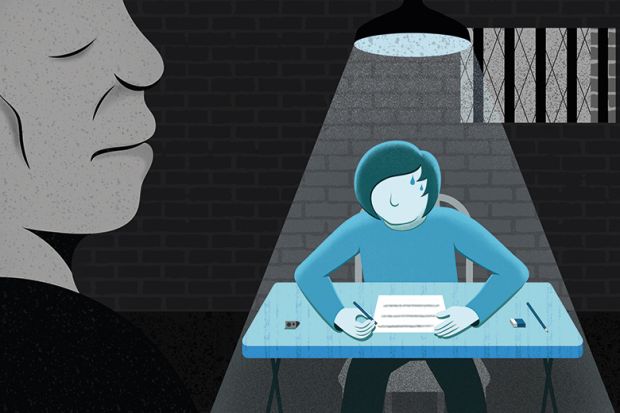Academics have never entirely trusted students not to cheat. Few exams, for instance, have ever been conducted without an invigilator prowling the aisles in search of surreptitious copying or smuggled-in notes. But the current level of institutionalised distrust of students has reached such a pitch that it seems reasonable to call it a moral panic.
Stanley Cohen in Folk Devils and Moral Panics defined this sociological phenomenon as occurring when “a condition, episode, person or group of persons emerges to become defined as a threat to societal values and interests”. Youth culture – street-fighting Mods and Rockers in the 1960s, riotous, small-town “lager louts” in the 1980s or ecstasy-addled ravers in the 1990s – has often been the subject of moral panics. Currently, hardly a week goes by without outraged reports in the academic press about students plagiarising or cheating in exams. These stories add to the impression that such behaviour is increasingly rife, threatening the moral fabric of academic life.
The ubiquitous use of plagiarism detection software is one symptom of the panic. When it was adopted in universities more than a decade ago, we were promised that it would be used largely for educational purposes – to teach students how to avoid plagiarism. Now it is pervasive; applied to all student work, even their PhD proposals. Everything they submit is now treated with suspicion. The progressive approach that we were promised has proved to be empty rhetoric.
Modern students are also required to sign attendance registers at lectures, make authorship declarations when submitting every assignment, and even produce a copy of a death certificate if missing a class to attend a family funeral.
Then there is the growth of learning analytics. These systems track every movement that students make around the physical and virtual campus. Few students are even aware that statistics are being collected about them on this basis, let alone what the purpose is. While academics must jump through hoops to gain ethical approval for any small-scale research project, institutions are collecting large datasets about students without their knowledge or permission.
There is no doubt that some students do deliberately try to cheat to gain an unfair advantage. Like any group in society, including academic staff, there will always be some who seek to find an illicit shortcut to success. But is there any real evidence that students are any less trustworthy now than in the past? According to received wisdom, the internet has made cheating more common, but a 2012 study of doctoral students showed that incidences of plagiarism have actually fallen since the early to mid-1990s. There is also the question of intent. A large-scale European-wide study from 2014 concluded that the majority of student plagiarism is accidental. As with all moral panics, we seem to have lost all sense of proportion.
Mass higher education means that we now have many more students, and therefore more instances of plagiarism. The numbers remain proportionately low, but the anonymity brought about by massification has made it much easier for students, as a body, to be distrusted. They are much less likely to be known to their lecturers; they are barely a face, let alone a name, on the crowded modern campus. They are more likely to be identified through their ID number on an online learning platform. They lack a sympathetic, trustworthy human face.
The same dynamic is at work when established communities fear immigrant communities – until they get to know, at a personal level, some of the individuals they contain. It is the basis for discriminatory treatment.
Students are not even trusted any more to learn without being kept under constant surveillance. This is why academic non-achievements, such as their lecture attendance or their “participation” in class, are now graded. In 1963, the UK's Hale Committee on University Teaching Methods argued that the long university vacations were essential to helping students develop intellectual independence. Things have now come full circle, with the Conservative government planning to introduce two-year degrees: an indication of just how little they trust students to learn independently, without a lecture timetable to obey.
Recently, one of my more earnest students asked me whether she was allowed to say anything in an essay without providing a reference. This is a shocking indication of the extent to which modern students feel intellectually shackled by universities’ paranoid policies around plagiarism, which assume that no student could have an original thought. Nor are levels of trust helped by defensive institutional policies more generally, which cast students as customers in an exchange relationship.
Like all moral panics, fears about the level and effects of student cheating are being blown out of all proportion. We need to call off the witch-hunt and trust in the capacity of our students to learn. Otherwise, we risk turning them into docile and ultra-cautious pedants, rather than lovers of discovery and creativity.
Bruce Macfarlane is professor of higher education at the University of Southampton.
后记
Print headline: Student cheating is hardly a threat; this moral panic must end




